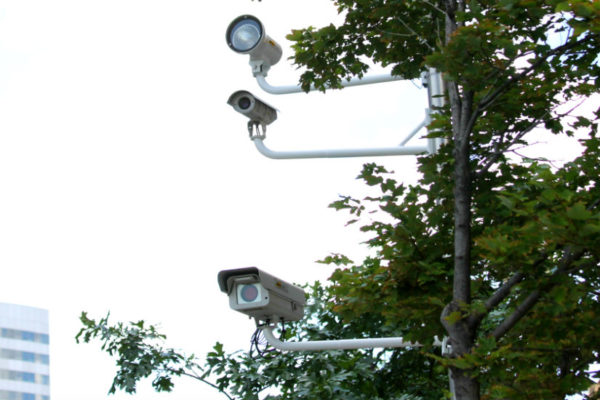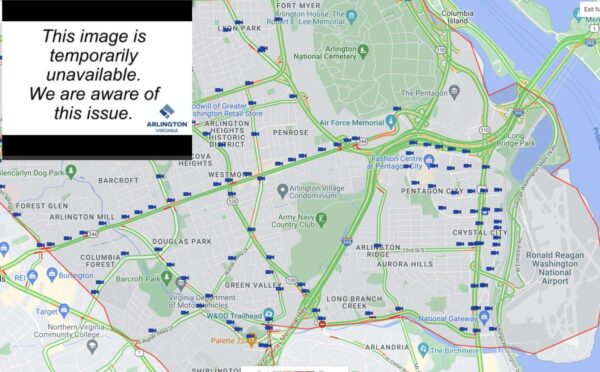
Arlington maintains a sizable network of traffic cameras, but a significant portion of those cameras have been “temporarily unavailable” in recent weeks.
It’s a problem that the county county is promising to fix.
The publicly viewable feeds of conditions on Arlington’s main roads help with real-time reporting on breaking news of crashes or hazardous driving conditions, such as heavy snow. The feeds also allow residents to check conditions before heading out.
Arlington County has more than 200 traffic cameras trained on its roads. As of last weekend, at least two dozen were out. A few weeks ago, in Pentagon City and Crystal City alone, about 40% of cameras were out, according to public safety watcher Dave Statter.
For comparison, it looks like only about 10% of the traffic cameras @VaDOTNOVA has along the entre length of I-395 in Virginia aren't working. That seems a lot more reasonable. https://t.co/RpSD8MWQ4G
— Dave Statter (@STATter911) October 21, 2022
Residents noted outages were an issue when the county moved the feeds from Trafficland.com to an in-house website back in 2015.
The outages have a variety of explanations, but the county is working on addressing them, according to the Dept. of Environmental Services.
“A camera feed can stop working for several reasons like equipment failure, communications issues, or planned construction,” spokesman Peter Golkin said. “Sometimes only a camera’s public feed is impacted while the internal feed continues. Although a single camera supplies both feeds, they can be independently impacted — especially in older analog cameras.”
Thanks for responding. Would also be interested in knowing what rules/guidance the County has issued on the operation of the cameras.
— Dave Statter (@STATter911) October 24, 2022
Public feeds are produced by the DES Transportation Engineering & Operations (TE&O) Bureau. Feeds are also shared internally with the county’s emergency services agencies.
He said while TE&O’s first priority is maintaining the internal feeds that support critical county services, given limited staff and resources, the bureau is “still stepping up its checks of the public feeds.”
“Many public feeds have been restored in recent weeks,” Golkin said. “To avoid confusion, staff are looking at ways to differentiate long-term, planned outages from temporary outages on the public website.”
The outages compound another issue: the county’s policy of censoring public feeds during incidents — from minor crashes to major public safety incidents. Turning off the feeds makes real-time reporting more difficult for ARLnow and other news outelts.
@ReadyArlington If you could rotate the traffic camera there that would be appreciated
— Arlington Now (@ARLnowDOTcom) October 21, 2022
Arlington says it controls what is relayed via traffic cameras during certain incidents to protect privacy.
“Arlington County upholds its values of transparency with public safety information beyond camera footage, including daily crime reports, press releases, emergency alerts, and EMS/fire event summaries,” the county said in a statement. “Camera access furthers our transparency but must be balanced with community privacy concerns.”
ARLnow was provided the following criteria that go into evaluating when to stop publicly broadcasting a traffic scene.
Cameras are diverted to protect:
- Health information: This includes identifiers related to a potential patient, like their face, demographics, and health condition. This is all protected information until the person is determined to no longer be a patient, which occurs after they sign a refusal to be assessed or transported.
- Law enforcement tactics and officer identity: The County protects the identities of law enforcement personnel who serve in plain clothes or undercover roles. Cameras may also be diverted during an active incident, such as an Emergency Response Team (ERT) response, to safeguard tactical information and ensure the safety of all present.
- Victim and witness privacy: Victim and witness privacy protection is always central, but especially if there are juveniles present — something responders wouldn’t know for sure until arriving at a scene. The County also seeks to protect victim and family privacy and dignity by diverting footage in a medical incident, especially when next of kin must be notified of a significant event.
It’s unclear how much identifiable information can be obtained, however, given the relatively lower resolution of the feeds.
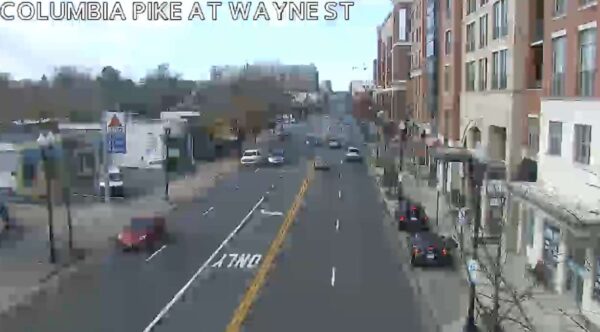
Sponsored by Monday Properties and written by ARLnow, Startup Monday is a weekly column that profiles Arlington-based startups, founders, and other local technology news. Monday Properties is proudly featuring 1515 Wilson Blvd in Rosslyn.
Longtime Arlington resident Jay Hedley flew A-10 fighter jets for 12 years in the Maryland Air National Guard.
When flying missions, his plane would track and record what he could see in front of him, as well as the targeting of missiles using a heads-up display. He and other pilots would review the video footage together after flying a mission to debrief.
“So then the idea came,” he said, “why don’t we train athletes the same way we use technology like this from the jet?”
So he founded HeadVantage, which equips athletes with mini cameras and eye-tracking technology. The HeadVantage camera can be fitted under the bill of a baseball cap and track the eye movements of the wearer. It can also measure the diameter of the wearer’s pupils a hundred times per second, Hedley said.
Apart from tracking eye movements, the camera also records high-definition, stabilized video footage that can be streamed live and shown on TV.
“One way you can think of it is, where GoPro can’t go,” said Hedley, distinguishing HeadVantage from the popular action camera brand.
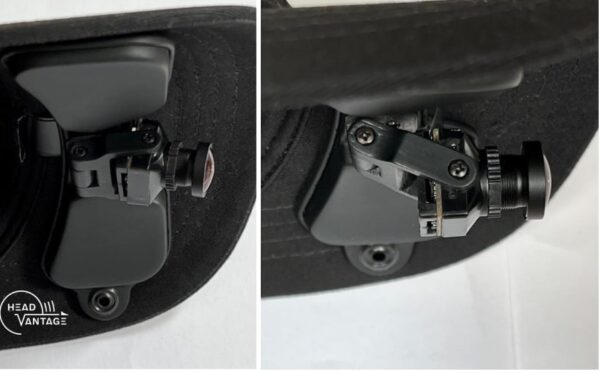
Because of the camera’s eye-tracking and streaming abilities, HeadVantage can provide unique content to sports fans, said Jenna Kurath, the head of Comcast NBCU SportsTech.
“To be able to see it from the perspective of the athlete, to get into the mind of the athlete through the eye-tracking of those split-second decisions that they’re making,” she said, “this is going to bring new fan-engagement content to the forefront.”
With this camera, sports commentators will be able to analyze an athlete’s performance from their viewpoint.
“Oftentimes our commentators will do the replay and say, ‘How did they do this?'” Kurath said. “Now this is the ability to kind of see it through the eyes of the athlete to really get a little bit more into their mind.”
Arlington-based HeadVantage was selected as part of Comcast NBCUniversal’s SportsTech Accelerator in 2022, a program that connected 10 startups with different program partners, such as NBC Sports, World Wrestling Entertainment and NASCAR. HeadVantage was chosen from among over 800 applicants around the world, according to a news release from NBCUniversal.
Since joining the program, HeadVantage has been prototyping the camera to be used in golf, fitting it in golfers’ glasses.
Instructors in NBC Sports’ golf shows, such as School of Golf‘s Martin Hall and others in the company’s subscribers-only GolfPass content, have used HeadVantage cameras, said Kurath, who also ran the startup program. The camera will be used in a few celebrity golf tournaments in the summer, she noted.
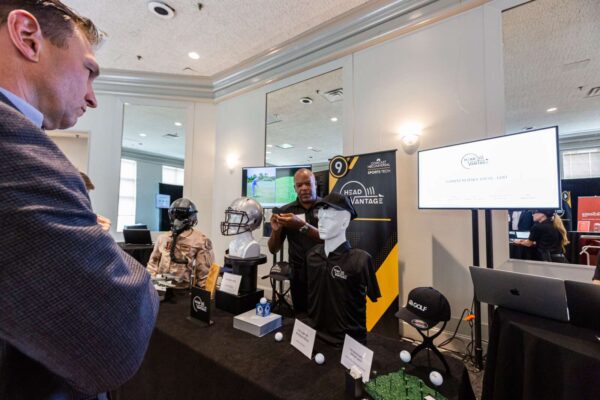
Hedley founded the startup in 2020, according to his LinkedIn page. Currently, his main customer is NBC Sports and his main goal for HeadVantage this year is to get the camera used in NBC golf coverage.
“I’d love to get embedded in NBC golf this year, maybe with baseball this year,” Hedley said, “So baseball and golf will be the two sports we’d focus on this year.”
New cameras enforcing speeding could be coming to Arlington school and work zones by the end of this year.
The County Board voted on Saturday to have speed cameras installed throughout the county near schools and on public roads where construction work is ongoing.
Board members heralded the cameras as a tool for protecting children, lowering severe and fatal crashes — an initiative known as Vision Zero — as well as reducing race- and ethnicity-based disparities in traffic enforcement and providing relief to overworked Arlington County Police Department officers.
“The idea that we can keep our community safer, address this behavior and then reduce demand on the police and reduce interactions with police is just a really heartening step for us to take,” said Board Chair Katie Cristol.
The vote follows the passage of state law in 2020 allowing municipalities to install speed cameras.
It also coincides with an anecdotal increase in speeding around schools, according to Board member Libby Garvey (although speed-related crashes in school zones have remained relatively constant at 10 per year, per county data).
“Maybe there hasn’t been a huge increase in crashes, but there has been an increase in bad behavior, and that’s pretty worrisome,” she said. “This is about children and safety.”
Last fall, Arlington County took steps to make school zones safer by lowering speed limits to 20 mph around 13 schools.
County staff are reviewing best practices, crash data, equity concerns and other local factors to determine where to place the cameras, Vision Zero project manager Christine Baker told the County Board. School zones encompass a 600-foot radius of a school crosswalk or school access point.
“We plan to be strategic and intentional about where we place speed cameras to ensure they’re effective in reducing speeds and promoting fairness and equity as well,” Baker said.
Board members said this should reassure motorists who also travel in D.C. and feel that camera locations are chosen to “trap” them and generate revenue rather than correct behavior.
Here’s what drivers need to know.
When will the program start?
Locations could be selected by this fall and the program could start as soon as cameras and warning signs are installed, either this winter or in early 2023.
Who will get citations?
Anyone going 10 miles per hour over the speed limit. Every citation will be issued after a sworn ACPD officer reviews the footage.
How much will citations cost? What are the other penalties?
Citations for the first 30 days of the program will be warnings that carry no fines. After that, they are $50 a fine, the same as red light-camera violations. The fines will go into the general fund.
Violations will be civil, not criminal, meaning they won’t add points to a person’s driver’s license or be considered for insurance purposes. Drivers can contest the violations.
How much will the program cost?
The program will cost $600,000 a year, and for now, ACPD anticipates the fines will offset the program’s costs, Capt. Albert Kim told the County Board. The costs include the purchase of 10 cameras, which can be moved, camera installation, program operations, ticketing and the salary of the full-time police employee reviewing the footage.
Where can I learn more about speed cameras?
Information in multiple languages will be available on the county website. The county will increase communication about the program through community email lists and the communication channels of APS and ACPD as the start date draws closer.
How will my data be protected?
State law requires Arlington police and the third-party vendor to delete footage and shred physical documents with personally identifiable information within a certain time frame: 60 days of reviewing the footage and determining the driver wasn’t speeding, or within 60 days of a driver paying a fine, Kim said.



